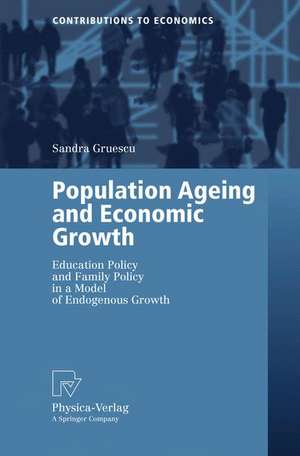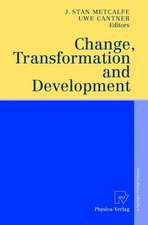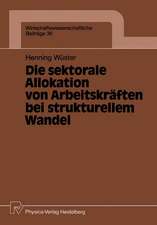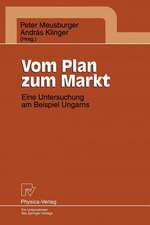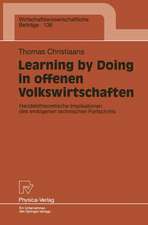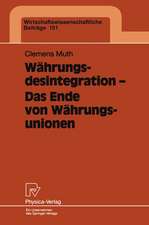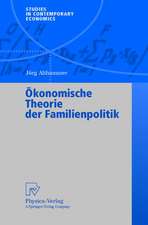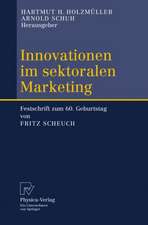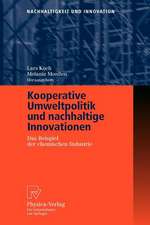Population Ageing and Economic Growth: Education Policy and Family Policy in a Model of Endogenous Growth: Contributions to Economics
Autor Sandra Gruescuen Limba Engleză Paperback – 20 noi 2006
Din seria Contributions to Economics
- 18%
 Preț: 1001.81 lei
Preț: 1001.81 lei -
 Preț: 90.83 lei
Preț: 90.83 lei - 15%
 Preț: 649.06 lei
Preț: 649.06 lei - 18%
 Preț: 1109.92 lei
Preț: 1109.92 lei - 24%
 Preț: 657.09 lei
Preț: 657.09 lei - 18%
 Preț: 976.54 lei
Preț: 976.54 lei - 17%
 Preț: 361.03 lei
Preț: 361.03 lei - 18%
 Preț: 1027.83 lei
Preț: 1027.83 lei -
 Preț: 283.93 lei
Preț: 283.93 lei - 15%
 Preț: 644.95 lei
Preț: 644.95 lei - 15%
 Preț: 638.24 lei
Preț: 638.24 lei -
 Preț: 394.29 lei
Preț: 394.29 lei - 15%
 Preț: 636.80 lei
Preț: 636.80 lei - 15%
 Preț: 637.78 lei
Preț: 637.78 lei - 18%
 Preț: 723.69 lei
Preț: 723.69 lei - 15%
 Preț: 635.47 lei
Preț: 635.47 lei - 15%
 Preț: 634.00 lei
Preț: 634.00 lei -
 Preț: 392.75 lei
Preț: 392.75 lei -
 Preț: 383.33 lei
Preț: 383.33 lei - 15%
 Preț: 636.80 lei
Preț: 636.80 lei - 18%
 Preț: 950.96 lei
Preț: 950.96 lei - 15%
 Preț: 634.68 lei
Preț: 634.68 lei -
 Preț: 387.38 lei
Preț: 387.38 lei - 15%
 Preț: 647.27 lei
Preț: 647.27 lei - 15%
 Preț: 636.63 lei
Preț: 636.63 lei - 15%
 Preț: 639.73 lei
Preț: 639.73 lei -
 Preț: 385.62 lei
Preț: 385.62 lei - 15%
 Preț: 641.85 lei
Preț: 641.85 lei - 20%
 Preț: 649.60 lei
Preț: 649.60 lei - 15%
 Preț: 641.71 lei
Preț: 641.71 lei -
 Preț: 387.96 lei
Preț: 387.96 lei - 15%
 Preț: 645.47 lei
Preț: 645.47 lei -
 Preț: 385.08 lei
Preț: 385.08 lei - 15%
 Preț: 646.62 lei
Preț: 646.62 lei -
 Preț: 383.33 lei
Preț: 383.33 lei - 15%
 Preț: 638.43 lei
Preț: 638.43 lei -
 Preț: 381.21 lei
Preț: 381.21 lei - 15%
 Preț: 642.51 lei
Preț: 642.51 lei - 15%
 Preț: 637.78 lei
Preț: 637.78 lei - 15%
 Preț: 641.71 lei
Preț: 641.71 lei -
 Preț: 384.70 lei
Preț: 384.70 lei -
 Preț: 379.86 lei
Preț: 379.86 lei -
 Preț: 378.34 lei
Preț: 378.34 lei -
 Preț: 384.70 lei
Preț: 384.70 lei -
 Preț: 388.52 lei
Preț: 388.52 lei - 15%
 Preț: 641.71 lei
Preț: 641.71 lei -
 Preț: 381.00 lei
Preț: 381.00 lei - 15%
 Preț: 644.95 lei
Preț: 644.95 lei -
 Preț: 386.00 lei
Preț: 386.00 lei
Preț: 637.28 lei
Preț vechi: 749.73 lei
-15% Nou
Puncte Express: 956
Preț estimativ în valută:
121.98€ • 132.54$ • 102.53£
121.98€ • 132.54$ • 102.53£
Carte tipărită la comandă
Livrare economică 21 aprilie-05 mai
Preluare comenzi: 021 569.72.76
Specificații
ISBN-13: 9783790819052
ISBN-10: 3790819050
Pagini: 216
Ilustrații: XII, 202 p. 7 illus.
Dimensiuni: 216 x 279 x 11 mm
Greutate: 0.33 kg
Ediția:2007
Editura: Physica-Verlag HD
Colecția Physica
Seria Contributions to Economics
Locul publicării:Heidelberg, Germany
ISBN-10: 3790819050
Pagini: 216
Ilustrații: XII, 202 p. 7 illus.
Dimensiuni: 216 x 279 x 11 mm
Greutate: 0.33 kg
Ediția:2007
Editura: Physica-Verlag HD
Colecția Physica
Seria Contributions to Economics
Locul publicării:Heidelberg, Germany
Public țintă
ResearchCuprins
Population in models of economic growth.- The size and the growth rate of population and economic growth.- Effects of a declining population in a model of economic growth.- Effects of a declining population in a model of economic growth with endogenous human capital - Lucas (1988).- Conclusions of Part I.- Models of economic growth with an ageing population.- Models of “Silver Growth”.- Models with exogenous population.- Models with quasi-endogenous population.- Models with endogenous population.- Conclusions.
Textul de pe ultima copertă
We review standard economic growth models concentrating on the relationship between population ageing and economic growth and develop a growth model with endogenous human capital and endogenous fertility. With this model we analyse the effects of education policy and family policy on economic growth. The main result for economic policy is that education policy boosts human capital and thus economic growth only in the short-term (i.e. during the transition phase towards the steady state). To boost economic growth in the long-term (i.e. when the economy has reached its steady state), it is necessary to employ family policy as this increases both the fertility rate and the time individuals spend accumulating human capital. The main result for economic growth theory is that steady state economic growth is not possible when population is ageing. Steady state growth is only possible if the age structure of the population is constant.
